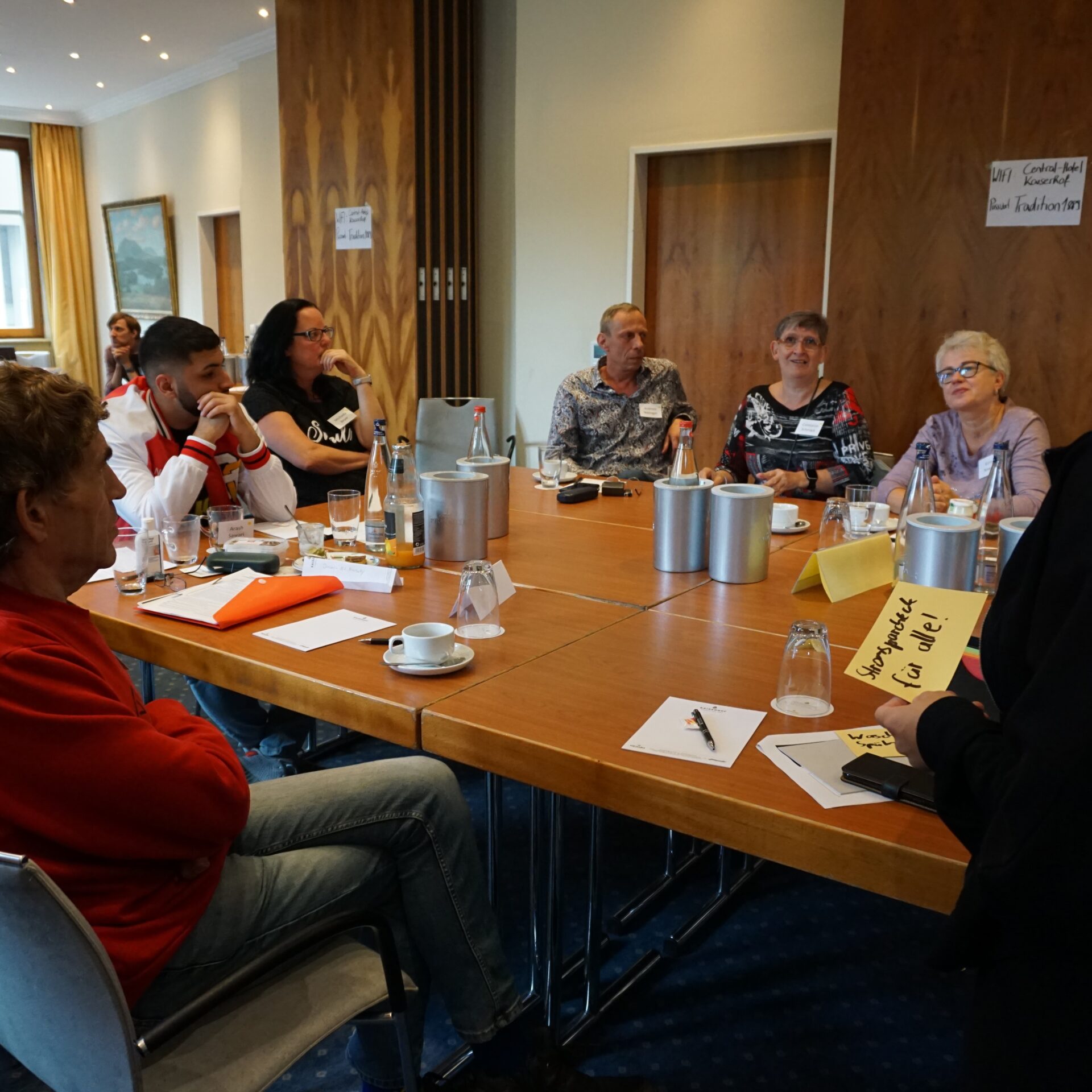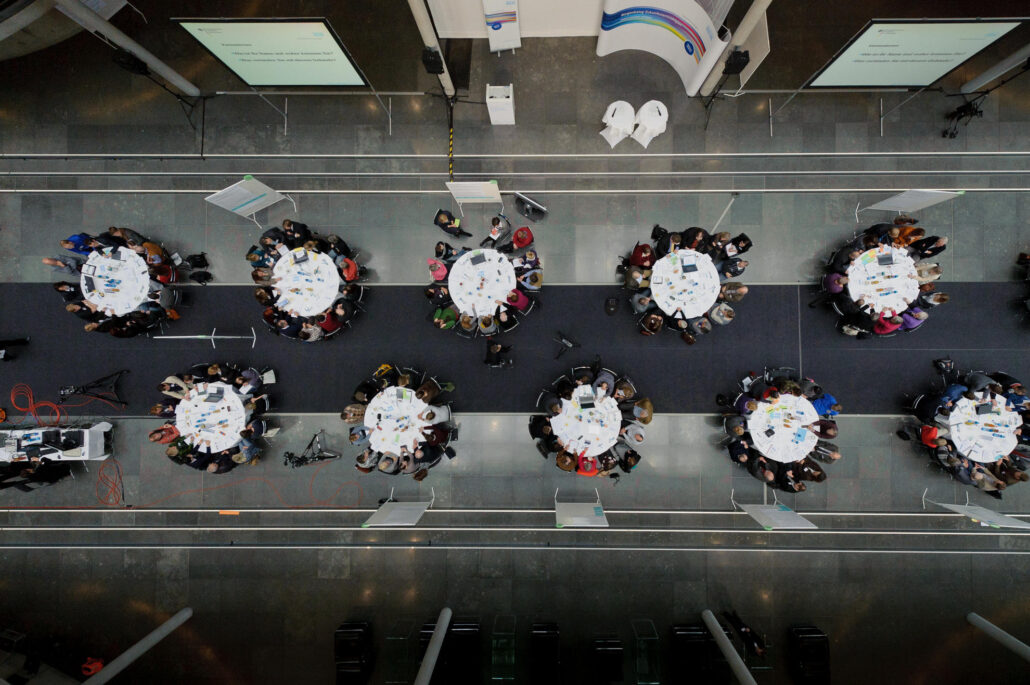Citizens’ assemblies are becoming increasingly important – globally and in Germany. The stratified random selection of participants makes them more inclusive than other forms of citizen participation, overcoming filter bubbles and providing a social sounding board. Just recently, Bärbel Bas, German President of the Bundestag, announced the further application of citizens’ assemblies, and Ursula von der Leyen, President of the European Commission, wants to use them in the future as well. The first four processes of this kind in Germany have taken place since 2019:
- Citizens’ Assembly on Democracy
- Citizens’ Assembly on Germany’s role in the world
- Citizens’ Assembly on Climate
- Citizens’ Assembly on Research
ifok, together with the nexus Institute, designed, organized and implemented these four citizens’ assemblies. In addition, we were involved at the EU level in the conception and implementation of the EU Citizens’ Forums as part of the Conference on the Future of Europe. Throughout the process, we have continuously developed the procedures and methods, because there is no patent remedy for the implementation of citizens’ assemblies. Our experience shows: Citizens’ assemblies can be used in a variety of ways and also work in the digital space. The key is to ensure political connection from the very beginning in order to enrich parliamentary and governmental work. A key factor here is that a citizens’ assembly or deliberation process is initiated and commissioned from within the political system, i.e., by parliaments or governments that turn to citizens with a specific question and can and want to use the results in their further work. To achieve this, the institutions sometimes need to adapt better to citizen participation, both organizationally and culturally. However, the beginnings have been made. Good examples are the Open Government Strategy in North Rhine-Westphalia or the Office for Civil Society and Citizen Participation in Baden-Württemberg.
In order to further increase the impact of citizen participation and citizens’ assemblies and strengthen political connection, various instruments can be used at different stages of the process in addition to the commissioning process. We gained positive experiences with these instruments and they do not jeopardize the openness and neutrality of the process.
Ensuring political connectivity – for an effective participation process
1. Agenda-setting – involving various stakeholders
The guiding question for the citizens’ assembly has usually already been defined. But what does the topic include, what should be the focus and what should the recommendations be about? On which topics and issues do policy makers want to hear the social perspective of a citizens’ assembly?
In three citizens’ assemblies, we involved politics, science and civil society (including randomly selected citizens) in participatory processes and carried out participatory agenda setting. In the Citizens’ Assembly on Research, on the other hand, the participants had the opportunity to determine the content of a session and thus to actively participate in shaping the process.
2. Process – interlocking with politics and administration
At the center of each citizens’ assembly are the randomly selected citizens. They listen to experts with different presentations and perspectives, deliberate with each other in a respectful atmosphere, weigh arguments, form an opinion, and develop recommendations for political action. During the process, there are various methods that ensure a connection to decision makers from politics and administration and thus contribute to the feasibility of the results.
- Input from experts: Politicians and administrators are invited to present their perspective on a topic. This sharpens the understanding of the participating citizens and shows the different perspectives on the topic. The presenting politicians and administrators learn about the process and the quality of the discussion and develop a greater willingness to use the results for their own benefit.
- Participant observation: Members of the Bundestag or representatives of the ministries can form their own impression of the citizens’ assembly and follow the discussions at selected meetings without actively participating. This gives the addressees of the recommendations a valuable insight into the work of the citizens’ assembly and also increases their ownership.
- Feedback from politicians and administrators: Are the recommendations within the realm of possibility? What is feasible and what is not? A citizens’ assembly can only be effective if the results are actionable. A feedback loop can create this fertile ground, both for the citizens’ assembly and for politics.
When using these methods, it is important to ensure the independence of the process such as a balance of input from different experts. Also, citizens should be given the opportunity to recommend anything that is important to them, irrespective of the feedback from politics and administration.
3. Implementation – ensuring connectivity at an early stage
The results of the citizens’ assembly are available and have been handed over to the politicians. Is the process complete now? No. Even in this phase, it can be useful for the citizens’ assembly to continue to accompany the implementation. This way decision-makers can ask questions, the participants can present their perspectives, and the process as a whole can benefit.
Institutionalization for sustainable change – Creating an independent administrative unit
In the long term, citizens’ assemblies and other citizen participation procedures can only become a more successful and effective part of the democratic system if the system itself gets involved and develops. On the one hand, structures and processes must be created that transfer the results of citizen participation into further political work in a comprehensible way. On the other hand, politicians and administrators need to understand that citizen participation is not just a communicative add-on but leads to important and helpful indications and recommendations. Both can be bundled in a dedicated administrative unit that would have to be anchored in the government, in parliament or between the two institutions. In North Rhine-Westphalia, for example, there is an office of the Open Government Strategy and responsible units for implementing the strategy in all state ministries, all of which are advised and supported by ifok.
What could be the functions of an independent administrative unit?
- An administrative unit should bundle competencies and advise other institutions and authorities on the organization and implementation of citizens’ assemblies and other procedures: Which instrument is the right one for my issue? How do I ensure that the results will help me? How do I find partners for implementation?
- An administrative unit can develop guidelines and rules on how citizens’ assemblies and citizen participation procedures should be implemented at the federal level. As an independent body and in contact with civil society actors, it can also monitor compliance with the guidelines and rules.
- The administrative unit should build up and expand competence for citizen participation in politics and administration. This can be done by the means of publications and an internal knowledge hub, as well as further training and fun learning opportunities. The administrative unit can also connect all actors who implement citizen assemblies and other procedures or are interested in doing so: employees in the ministries, administrations and the Bundestag.
- The administrative unit itself should set an example and allow its creation and work to be accompanied by citizens, test flexible and learning structures, new ways of working and procedures, and initiate projects for cultural change in the administration.
Take the opportunity now and improve our democracy with citizens’ assemblies
Our society is becoming increasingly diverse and individual. Even if these are generally positive developments, they challenge our social cohesion. The institutions of parliamentary democracy alone can no longer reflect and process this diversity. In the future, they should confidently use citizens’ assemblies and other procedures of citizen participation whenever it makes sense. This way they can use the power of deliberation of ordinary people in complex problem situations and polarized debates. ifok is ready for this.
Written by Felix Hoffmann, Jana Peters and Jacob Birkenhäger
Questions? Talk to us!

Jacob Birkenhäger
Business Unit Manager | Deliberation, Open Government, Democracy
| Phone | +49 30 536077-45 |
|---|---|
| jacob.birkenhaeger@ifok.de |
Learn more

Article
“We are not socially weak; we are financially weak.”
In the Fair Energy Forum we involve people in participatory processes who usually don’t have a voice in the pu…
Continue reading „“We are not socially weak; we are financially weak.”“
